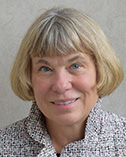
Linda B. Smith
Indiana University
|
Primary Section: 52, Psychological and Cognitive Sciences Secondary Section: 34, Computer and Information Sciences Membership Type:
Member
(elected 2019)
|
Biosketch
Linda Brawn Smith is a cognitive scientist recognized for her work on early object name learning as a form of statistical learning. Smith co-discovered infants' few-shot learning of object names, showed that few-shot learning is itself learned, and documented the relevant experiences. Smith was born in and grew up in Portsmouth, New Hampshire. She graduated from the University of Wisconsin (Madison) with a Bachelor of Science degree in experimental psychology and from the University of Pennsylvania with a Ph.D. in experimental psychology. She joined the faculty of Indiana University (Bloomington) in 1977 and is in the Department of Psychological and Brain Sciences and the Program in Cognitive Science. She won the David E. Rumelhart Prize for theoretical contributions to cognitive science and is a member of both the National Academy of Sciences and the American Academy of Arts and Science.
Research Interests
Linda Smith's laboratory takes a complex systems approach to understanding the interdependencies among perceptual, motor and cognitive development during the first two years of post-natal life. Using wearable sensors, including head-mounted eye-trackers and motion sensors, the laboratory studies how the young learner's own behavior selects and generate the sensory inputs for learning and how changing motor abilities during the first two years of post-natal life define an ordered curriculum of expected experiences and tasks. Using head-cameras and audio recorders embedded in hats, the laboratory also captures and analyzes large corpora of infants' and toddlers' everyday visual and auditory experiences at home. The work has led to novel insights about the natural statistics of developmental environments as well as the learning mechanisms that exploit those statistics. These insights are also being explored through collaborations in robotics and artificial intelligence.

